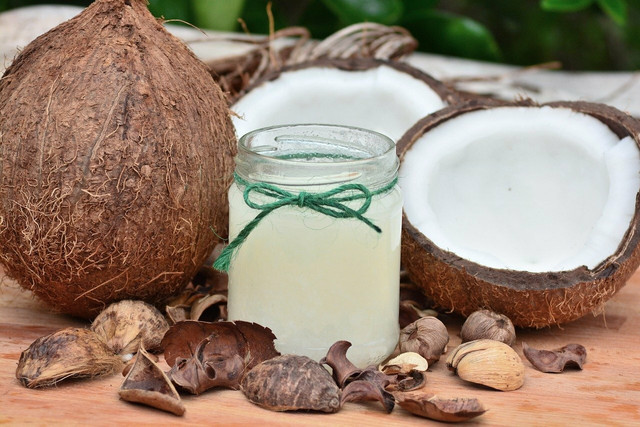Coconut oil has earned a spot on our kitchen counters, but does that mean we can use it for our beards? We'll explore some benefits, drawbacks, and uses to determine if coconut oil for beards is worth the hype.
Benefits of Coconut Oil for Beards

(Foto: CC0 / Pixabay / moho01)
Although it has existed for centuries, coconut oil has enjoyed a recent explosion in popularity for its versatility in both cooking and cosmetics. With the likewise recent resurgence of beards as a symbol of attractiveness, it’s little surprise that coconut oil has become a standard in facial hair care.
Because beards have a tendency to become rough, wiry, and dry out the face as they grow, beard oil has become a popular care item to moisturize and groom facial hair. While jojoba and argan oils are often used in commercial beard oils, these ingredients are more expensive and are not generally suitable for cooking due to their intensive and limited production.
In contrast, coconut oil is a more affordable option that can be bought in larger quantities, and which offers several benefits for beard care:
- Coconut oil moisturizes both the beard and the skin underneath, which becomes essential to combat dryness that often occurs as beards grow longer.
- It can thereby eliminate the dreaded “beardruff” caused by dry skin flaking and becoming trapped in the beard.
- It can soften the beard, which may become rough as it grows. Coconut oil may also strengthen hair and prevent split ends, and can also be used for natural eyelash growth.
- It can be used to style beards, make the hair look shiny, and keep unruly strands in place.
- Coconut oil contains a high amount of lauric acid, a fatty acid that increases skin elasticity and helps fight acne due to its anti-microbial properties.
- There are many claims that coconut oil can also stimulate hair growth and prevent balding, but the evidence remains weak.
Possible Drawbacks



(Foto: CC0 / Pixabay / TanteTati)
Despite its host of benefits, coconut oil also has some drawbacks that you need to be aware of. While coconut oil may reduce microbes that cause acne, it also has the potential to clog pores and ironically make acne even worse. Additionally, while rare, coconut oil may cause inflammation in those with allergies.
There are also personal preferences to consider: since the melting point of coconut oil is 76 degrees Fahrenheit, you may have inconsistent results depending on the temperature. Your coconut oil may be liquid in warm weather and more like a balm in cool weather.
There are also environmental factors to consider:
- Unlike the argan and jojoba oils, whose trees are cultivated in deserts and thus cause no deforestation, coconuts grow in tropical zones and their cultivation poses a threat to the large number of species that live there. One study has claimed that coconut oil is more harmful than even palm oil based on the extensive land use for the small amount of oil, though this study also fails to include other coconut products such as water, milk, flesh, and husks.
- Since coconuts are primarily cultivated in Asia, the long distance transportation has a greater carbon footprint than jojoba, which is cultivated in the United States and Mexico.
- Unlike the large industrial plantation associated with palm oil, coconuts are often grown on smaller scale farms and must be handpicked. This also means that these farmers are more likely to be underpaid and exploited as cheap labor.
- Extracting and refining coconut oil often involves the use of chemicals and machinery, thus producing waste and an added carbon footprint. Unrefined cold-pressed oil is more sustainable, but also carries the distinct coconut smell which some people may find unpleasant.
How to Use Coconut Oil for Beards



(Foto: CC0 / Pixabay / kaziminmizan)
Applying coconut oil to beards is a straightforward process and requires less than a teaspoon to achieve a shiny, luxurious-looking beard.
- Start by warming the balm in your hands until it dissolves into an oil; this makes it easier to apply.
- Use your fingers to comb the coconut oil through your beard, making sure to coat both your face and the individual strands of hair (for maximum moisturizing). In order to better incorporate the oil into your beard, you can also use a boar bristle brush, or a vegan alternative, which has the added benefit of exfoliating the skin underneath and releasing trapped dandruff (available as a kit on Amazon**).
- You can leave the coconut oil in your beard all day for lasting hydration, or use a larger amount as a targeted treatment to moisturize your beard for a few hours.
- Whichever way you use it, remember to wash the coconut oil out daily and reapply to keep your beard fresh.
The Verdict: Is Coconut Oil for Beards Worth the Hype?



(Foto: CC0 / Pixabay / monicore)
Given the many potential benefits of coconut oil and the few unlikely side effects, there is little harm in trying coconut oil for beards. Even if it doesn’t work well for your facial hair, it won’t go to waste, as you can use it to cook up a delicious meal. Either way, it is important to be a responsible consumer when purchasing coconut oil in order to minimize your carbon footprint and ensure that the coconut farmers are being compensated fairly.
Additionally, since the refining process requires more energy and produces more waste, it’s best to opt for a cold-pressed, unrefined, and fair-trade coconut oil such as Nutiva (available on nutiva.com or on Amazon** without the Fairtrade certification).
Read on:
- 9 Coconut Oil Health Benefits You Need to Know
- How to Use Coconut Oil for Your Hair: 3 Tips
- How to Make Shaving Cream: A Simple DIY Recipe
Do you like this post?








